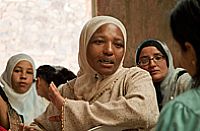Grassroots Solutions
Connecting Local and Global
by Masum Momaya, Curator
It has been said that women who are closest to the world’s most pressing issues are best placed to solve them. In many countries, women are adjusting to large-scale economic changes by organizing community-based efforts on a grassroots level. But local solutions can only do so much, especially given the complexity of today's global problems. While women's creativity and resourcefulness should be applauded, we can't expect women to clean up, compensate for and fix larger economic problems without also giving them a voice in larger decisions. Read more
|
David Kauck, a senior gender and agriculture specialist at the International Center for Research on Women, explains why it's important to invest in women farmers.
|
The Independent Television Service presents stories of remarkable women fighting for social and economic change against extreme obstacles.
|
|
|
Graciela De Oto explains Suma Veritas, an organization in Argentina that connects businesswomen and entrepreneurs with mentors and support systems.
|
Joyce Mungherera, vice president of the World YWCA, is changing the world one Ugandan woman at a time--proving that starting small can make a big difference.
|
|
|
Photojournalist Paola Gianturco visited the Barefoot College in India and met women from all over Africa who are being trained to become solar engineers.
|
Mujeres Constructoras, an innovative organization in Nicaragua, trains women in carpentry and electrical work. The women use their new skills to build furniture, homes and their future.
|
|
|
Filmmaker Sumithra Prasanna visited a unique institution in India that relies on community members, rather than experts, to help solve local problems.
|
Artist Cheryl Braganza depicts the optimism of women earning new respect and assisting each other at the grassroots level for a brighter economic future.
|
|
|
Empowering women is good for the economyand the society. Listen as social economist Naila Kabeer talks about the relationship between social justice, economic growth, and gender equity.
|
A grassroots center in India gives street children training in skills that could lead them to a brighter future.
|
|
|
Dolores Huerta talks about women's roles as workers and leaders in social change, and how getting to the root of grassroots movements will help steer the economy in a new direction.
|
Nannies, seamstresses, street vendors and pedi-cab drivers: more women than ever are participating in the informal economy, says community organizer Gichelle Cruz.
|















